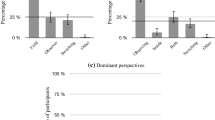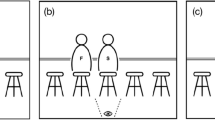Abstract
Sometimes I remember my past experiences from an ‘observer’ perspective, seeing myself in the remembered scene. This paper analyses the distinction in personal memory between such external observer visuospatial perspectives and ‘field’ perspectives, in which I experience the remembered actions and events as from my original point of view. It argues that Richard Wollheim’s related distinction between centred and acentred memory fails to capture the key phenomena, and criticizes Wollheim’s reasons for doubting that observer ‘memories’ are genuine personal memories. Since field perspectives in personal memory are also likely to be the product of constructive processes, we should reject the common assumption that such constructive processes inevitably bring distortion and error. Yet field perspectives tend to be treated as privileged also in the domains of memory for skilled movement, and memory for trauma. In each case, it is argued that visuospatial perspective in personal memory should be distinguished from other kinds of perspective such as kinesthetic perspective and emotional perspective.
Similar content being viewed by others
References
Barnier, A. J., Sutton, J., Harris, C. B., & Wilson, R. A. (2008). A conceptual and empirical framework for the social distribution of cognition: The case of memory. Cognitive Systems Research, 9, 33–51.
Bernecker, S. (2008). The metaphysics of memory. Berlin: Springer.
Berntsen, D., & Rubin, D. C. (2006). Emotion and vantage point in autobiographical remembering. Cognition and Emotion, 20(8), 1193–1215.
Brewer, W. (1996). What is recollective memory? In D. Rubin (Ed.), Remembering our past (pp. 19–66). Cambridge: Cambridge University Press.
Brugger, P. (2002). Reflective mirrors: Perspective-taking in autoscopic phenomena. Cognitive Neuropsychiatry, 7(3), 179–194.
Callow, N., & Hardy, L. (2004). The relationship between the use of kinaesthetic imagery and different visual imagery perspectives. Journal of Sports Sciences, 22, 167–177.
Campbell, J. (1997). The structure of time in autobiographical memory. European Journal of Philosophy, 5, 105–118.
Campbell, S. (2004). Models of mind and memory activities. In P. DesAutels & M. Walker (Eds.), Moral psychology: Feminist ethics and social theory (pp. 119–137). Lanham, MD: Rowman & Littlefield.
Choi, J. (2005). Leaving it up to the imagination: POV shots and imagining from the inside. Journal of Aesthetics and Art Criticism, 63(1), 17–25.
Crawley, S. E., & French, C. C. (2005). Field and observer viewpoint in remember-know memories of personal childhood events. Memory, 13(7), 673–681.
Debus, D. (2007). Perspectives on the past: A study of the spatial perspectival characteristics of recollective memories. Mind & Language, 22(2), 173–206.
Foulkes, D. (1994). Point of view in spontaneous waking thought. Perceptual and Motor Skills, 78, 681–682.
Freud, S. (1899). Screen memories. In J. Strachey (Ed.), The standard edition of the complete psychological works of Sigmund Freud (Vol. 3, pp. 303–322). London: Hogarth Press.
Goldie, P. (2003). One’s remembered past: Narrative thinking, emotion, and the external perspective. Philosophical Papers, 32(3), 301–319.
Higginbotham, J. (2003). Remembering, imagining, and the first person. In A. Barber (Ed.), Epistemology of language (pp. 496–533). Oxford: Oxford University Press.
Hirst, W. (2009). A virtue of memory: The contribution of mnemonic malleability to collective memory. In P. Reuter-Lorenz, K. Baynes, G. Mangun, & E. Phelps (Eds.), The cognitive neuroscience of the mind: A tribute to Michael Gazzaniga. Cambridge, MA: MIT Press.
Hoerl, C. (2007). Episodic memory, autobiographical memory, narrative: On three key notions in current approaches to memory development. Philosophical Psychology, 20, 621–640.
Loftus, E. F. (2005). Planting misinformation in the human mind: A 30-year investigation of the malleability of memory. Learning & Memory, 12, 361–366.
Mackenzie, C. (2000). Imagining oneself otherwise. In C. Mackenzie & N. Stoljar (Eds.), Relational autonomy (pp. 124–150). Oxford: Oxford University Press.
Mackenzie, C. (2007). Imagination, identity, and self-transformation. In K. Atkins & C. Mackenzie (Eds.), Practical identity and narrative agency (pp. 121–145). London: Routledge.
Mahoney, M. J., & Avener, M. (1977). Psychology of the elite athlete: An exploratory study. Cognitive Therapy and Research, 1(2), 135–141.
Martin, C. B., & Deutscher, M. (1966). Remembering. Philosophical Review, 75, 161–196.
Martin, K. A., Moritz, S. E., & Hall, C. R. (1999). Imagery use in sport: A literature review and applied model. The Sport Psychologist, 13, 245–268.
McIsaac, H. K., & Eich, E. (2002). Vantage point in episodic memory. Psychonomic Bulletin & Review, 9(1), 146–150.
McIsaac, H. K., & Eich, E. (2004). Vantage point in traumatic memory. Psychological Science, 15(4), 248–253.
Mohr, C., & Blanke, O. (2005). The demystification of autoscopic phenomena: Experimental propositions. Current Psychiatry Reports, 7, 189–195.
Nigro, G., & Neisser, U. (1983). Point of view in personal memories. Cognitive Psychology, 15, 467–482.
Recanati, F. (2007). Imagining de se. Presented at conference ‘Mimesis, Metaphysics, and Make-Believe’. http://halshs.archives-ouvertes.fr/docs/00/16/07/57/PDF/de_se_imagining11.pdf. Accessed 5 October 2009.
Rice, H. J., & Rubin, D. C. (2009). I can see it both ways: First- and third-person visual perspectives at retrieval. Consciousness and Cognition, 18(4), 877–890.
Robinson, J. A., & Swanson, K. L. (1993). Field and observer modes of remembering. Memory, 1(3), 169–184.
Schacter, D. L. (1996). Searching for memory: The mind, the brain, and the past. New York: Basic Books.
Schechtman, M. (1994). The truth about memory. Philosophical Psychology, 7, 3–18.
Smith, M. (1997). Imagining from the inside. In R. Allen & M. Smith (Eds.), Film theory and philosophy (pp. 412–430). Oxford: Oxford University Press.
Sutton, J. (2009). Remembering. In P. Robbins & M. Aydede (Eds.), The Cambridge handbook of situated cognition (pp. 217–235). Cambridge: Cambridge University Press.
Tulving, E. (2000). Concepts of memory. In E. Tulving & F. I. M. Craik (Eds.), The Oxford handbook of memory (pp. 33–43). Oxford: Oxford University Press.
Velleman, J. D. (1996). Self to self. Philosophical Review, 105(1), 39–76.
Viard, A., Piolino, P., Desgranges, B., Chételat, G., Lebreton, K., Landeau, B., et al. (2007). Hippocampal activation for autobiographical memories over the entire lifetime in healthy aged subjects: An fMRI study. Cerebral Cortex, 17(10), 2453–2467.
Williams, B. (1973). Imagination and the self. In Problems of the self (pp. 26–45). Cambridge: Cambridge University Press.
Wollheim, R. (1979). Memory, experiential memory, and personal identity. In G. F. Macdonald (Ed.), Perception and identity (pp. 186–234). Ithaca, NY: Cornell University Press.
Wollheim, R. (1984). The thread of life. New Haven: Yale University Press.
Acknowledgements
Earlier versions of some of these ideas were presented in talks to the Melbourne Brain & Mind Club at the Howard Florey Institute, at the Macquarie Centre for Cognitive Science, at a Memory Day seminar at Macquarie University, and in the Pacific APA symposium on memory in Vancouver with Alex Byrne and Mohan Matthen. My thanks to audiences on those occasions for their queries, and for specific help or discussion to Catharine Abell, Amanda Barnier, John Buckmaster, Rebecca Copenhaver, Dorothea Debus, Russell Downham, Jordi Fernandez, Catriona Mackenzie, Doris McIlwain, Michelle Moulds, Seong-Seng Tan, and Carl Windhorst.
Author information
Authors and Affiliations
Corresponding author
Rights and permissions
About this article
Cite this article
Sutton, J. Observer perspective and acentred memory: some puzzles about point of view in personal memory. Philos Stud 148, 27–37 (2010). https://doi.org/10.1007/s11098-010-9498-z
Published:
Issue Date:
DOI: https://doi.org/10.1007/s11098-010-9498-z




